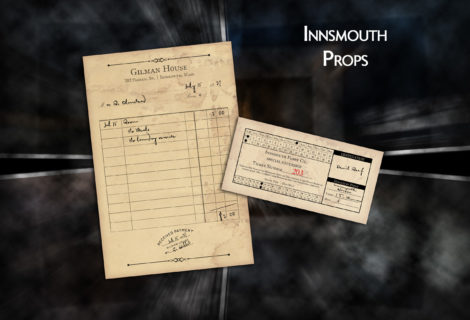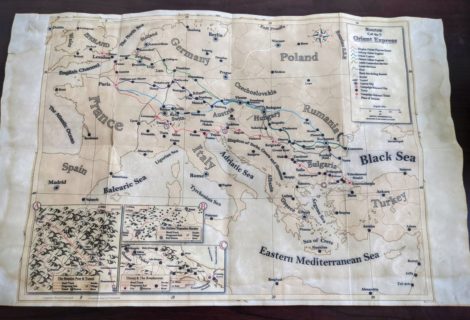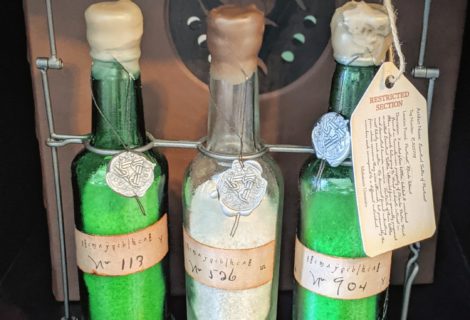Why Fate? – Choosing a System – Part 4
Why Fate?
Chances are that if you’re reading this (and especially if you’ve read any of my previous posts), you are probably asking at least one of three questions:
- What’s Fate?
- I don’t like Fate, why are you using it for a mythos game?
- I like Fate, but why are you using it for a mythos game?
Again, my overall goal is to be able to use scenarios from existing mythos games like Call of Cthulhu and play with my family. Understand that Call of Cthulhu, Trail of Cthulhu, and others are in many ways intended to tell stories like those portrayed in the fiction of H.P. Lovecraft and other mythos authors. Unlike like many other traditional RPGs, Fate is specifically designed to simulate fiction – books, television, movies. So if I focus on trying to tell the kinds of stories you see in that fiction – and the kinds of stories told playing these other games – then using Fate to tell stories in the Lovecraft mythos isn’t really all that strange of an idea.
If you’re familiar with Fate, chances are that you’ve read somewhere that it isn’t all the great a system for horror or investigation – which again raises questions about why I would use this system. While the prevailing attitude towards using Fate for horror has long been that there are better options, there are enough great ideas out there about how to use Fate to run really good horror games that a whole book was released on the subject – The Fate Horror Toolkit.
Update: It’s also worth noting that another relevant development has arrived on the scene since I wrote the initial draft of this post – it’s even a mythos game! Fate of Cthulhu is currently on Kickstarter, and it’s coming from Evil Hat, the creators of Fate. It’s not clear at this point precisely how much investigative horror will play into this game, since it’s billed as “Terminator-style action and adventure” meets the Mythos. I’m fairly confident that this won’t check all the boxes for what I want to play, so I’m continuing with my efforts, but I’m definitely eager to see what they’ve come up with. If nothing else it demonstrates clearly that Fate can handle gaming in the mythos, and I’m proud to be a backer of the Kickstarter.
It’s possible that Fate might not work that well for investigative gameplay, and that this ultimately won’t work. I’m willing to try it any way. At this point, I actually think that has more to do with how some players approach investigative games than any inherent misalignment between the genre and the system. The more I explore some of the great ideas on the net about how to build and play investigative scenarios, the more I think that Fate should work just fine.
Narrative First
One idea that’s important to me playing with my family is that we are able to simply go with what makes sense in the story. I don’t want to have to look up situation-specific rules, and I don’t want players making decisions based solely on stats. I want to be able to ask what they want to do in the given situation, and be able to easily play out their actions. I also want a system that rewards planning ahead and considering the consequences of your action, as that’s going to be an important concept in our games.
The Golden Rule of Fate is this: Decide what you’re trying to accomplish first, then consult the rules to help you do it. This is often paraphrased as “Fiction First” and has a few implications. The first is that you should always start with what a character would do in a particular situation. This should hardly be unusual in a roleplaying game, but in practice with a lot of other games, players get in the habit of taking action based on numbers and what their characters are most likely to succeed at – rather than on how their characters would typically react. Another consequence of this rule (and its corollary – the Silver Rule) is that what makes logical sense take priority over other rules. Needless to say this all lines up very well with my desire to focus on what makes logical sense in the story.
Player Choices
Somewhere along the line in the last few years of reading about designing and gamemastering RPGs, I recall reading that the best games involve challenging and interesting choices. In fact, something I try to consciously assess when I’m considering options for how to apply or tailor a mechanic is to ask if the mechanic forces the player to make an interesting choice.
Fate Core is all about the players making choices. Deciding whether to concede a conflict early and cut your losses or to press on to achieve your goal despite the toll it will take. Deciding whether to take your chances on an even-odds roll or expend precious resources to increase your chances of a successful roll. Spending points to avoid a problematic turn of events or welcoming a new complication in exchange for points you can use later. All of these are common choices Fate players have to make numerous times in the course of play.
It’s often said that players in Fate can accomplish just about anything if they are willing to pay the price. A major Fate player and contributor, Rob Hanz, phrased this as “How much do you want this, and what are you willing to give up to get it?” in his well-known collection of musing on Fate, titled the Book of Hanz. Not only is that very much in line with what I’m going for, it can also make for some excellent stories of dangerous knowledge and tragedy as investigators try to avert disaster in the mythos.
PC Freedom, GM Toolbox
Many games offer a veritable laundry list of options for PCs – how to do X, how to do Y, how to do Z – just about anything a player can think of to try has a rule. There’s just two problems with that: First, that’s a lot of rules to remember or look up, so players rarely remember what they have at their disposal. Second, if there’s not a rule for something, you’re often out of luck. Fate has a small list of basic actions, but when coupled with the rest of the system they can be leveraged effectively to handle anything the players come up with.
On the other side of the table, the same actions give the GM a comparable array of options. By default, Fate Core provides GMs with easy ways to present key issues within the game world, simple methods to both quickly generate simple mob-like NPCs and detail more central characters, and plenty of ways to model just about anything the players can imagine. While Fate Core by default is very setting-agnostic, there are a myriad of mechanics in toolkits available from Evil Hat that provide ways to tailor the system for specific settings and themes. Throw in more ideas shared by a vibrant community, including those in the Fate Codex e-zine, and there is a massive library of ideas and tools for the GM.
Powerful Flexibility
Part of the reason I believe Fate has been so successful is its flexibility. The rules as written (often abbreviated as RAW) are powerful enough to handle whatever you throw at them, without being overly complex. However, a lot of the text can be interpreted in a few different ways, depending on your context and what you’re aiming to get out of the game. In some games, this openness to differences in interpretation and application could hobble use and acceptance of the system, but this has actually worked to Fate’s advantage. New players can face some challenges getting comfortable with the system, but that’s usually due to preconceptions from previous RPG experience or issues of interpretation that can easily be addressed when going for a particular style of gameplay in a specific setting.
The other benefit of this flexibility is that there is almost always more than one way to handle any given narrative situation within the system. This fact enables players and the GM to adopt the approach they find most appealing in light of their preferred play style. It also makes it easier to stay consistent and keep the variety of different mechanics to a minimum.
Scale is also handled extremely well in Fate, so it can handle interactions between two competing galactic empires as easily as it can between two characters. The core techniques and mechanics used to represent a character are the same as those used to represent an organization or a location, so you don’t have to learn a whole new approach to scenario prep or play just because characters are affecting things on a larger scale. The GM can represent a nation-spanning fanatical cult as easily as a single NPC.
Descriptive Aspects
This might seem a bit odd at first, but one element of being a GM that I have long had issues with is describing locations and scenes, especially with investigative games. I’ve never liked reading scene descriptions in published scenarios, partly because such descriptions usually only exist for certain scenes, and I’m not great at improvising detailed descriptions. The biggest issue I’ve seen with this in investigative games is that on more than one occasion, I’ve seen players do one of two things:
- Completely miss a big hint that was in the description that should have helped point them in the right direction to move the story forward.
- Seize upon a mundane detail that was included only for fluff or color, convinced that it is the key to figuring out the mystery.
This plays a big part in how I’m handling clues in the game, but in a more general way I’ve also seen it impact other styles of games. I don’t like the idea of a GM spending time creating colorful details (which can admittedly aid in immersion), only to have those details ultimately send the players down a rabbit hole and grind the game to a halt. I also don’t like the idea of a game devoid of atmosphere, where the players feel like they can only make use of the specific details the GM spoon feeds them.
If there is one word that best defines how Fate differs from other system, it’s this: aspects. At its simplest, an aspect is a short phrase that describes some element of the game world. Aspects are used to describe important elements of characters, locations, items… everything. They have mechanical effects on the game, and their importance is determined by how much they are used in play – in other words, it’s up to the players and the GM how much of an impact any particular aspect has on the story.
Aspects provide an advantage when it comes to describing scenes because the system explicitly allows you to make assumptions about a location because of its aspects. So if a location has an aspect Archaeology Professor’s Artifact-Laden and Disheveled Office, everyone can assume that a lot of things are naturally present in the office – a desk, shelves, lots of books, maps, papers everywhere, journals and notebooks, and plenty of artifacts – and everyone has enough information to have a shared mental image of the scene. It’s not necessary to detail everything in the office up front. If it’s logical that something would be present, it is. And the GM can still provide more detail in response to the PC’s actions.
Hackable
As a final point on why I’m going with Fate as a starting point, as a system it is eminently hackable. By default, it’s flexibility naturally lends the game to be tailored to your table. Leveraging the many options and ideas available only expands the ways you can customize the system. Even more than that, the system has a lot of give to it. While it is obviously important to understand how changes to one mechanic can affect other parts of the system, Fate is very forgiving. You can make quite a few changes – even to the point of significantly altering how the game plays from one scene to another – without the system falling apart.
Wrapping Up
This has already taken far longer to finish and post than it should have, but I should mention that there is already a mythos Fate game on the market. Modiphius released a Fate Core version of Achthung! Cthulhu, which is essentially a pulpy mashup of WWII and the mythos. Rather than an investigative game involving ordinary people, as is common in mythos games, stories in Acthung! Cthulhu revolve around soldiers and spies in military operations during the war. It is hyper-focused on that setting, so using it for other types of mythos games would require some adaptation. It also does not include much in the way of rules – it is meant to be used in conjunction with the Fate Core rulebook. There are a few rules provided to incorporate horror and mythos elements into the system – and I’m certainly going to look at using them where I can – but it doesn’t offer much in the way of using Fate for investigative gameplay or provide guidance for how to really play Fate in a way that aligns with a mythos theme and setting.






Trackbacks for this post